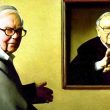Peter Misek, Analyst, Jefferies and Company, is interviewed on Bloomberg Surveillance
November 8, 2011
SPEAKERS: Tom Keene, Bloomberg Surveillance Host
Ken Prewitt, Bloomberg Surveillance Co-Host
Peter Misek, Analyst, Jefferies and Company, 9:13 minutes
Listen to this interview here (press play):
http://media.bloomberg.com/bb/avfile/News/Surveillance/v2avxlmYpNnc.mp3
****
TOM KEENE, BLOOMBERG SURVEILLANCE HOST: Peter Misek with Jefferies on the future of BlackBerry. Peter, good morning.
PETER MISEK, ANALYST, JEFFERIES AND COMPANY: Good morning.
KEENE: You have some terrific research. First of all, you talk the paradox of smartphone growth in 2012. What do you mean by that?
MISEK: We mean that we are actually getting to smartphone saturation in the post-paid market, meaning contract cell phone users in the United States. And we are likely to reach that level in 2012 in western European economies, and then globally, a few years later.
And what that means is that growth going forward is going to be driven by the prepaid market and emerging markets, which means lower SPs and pressure on margins.
KEN PREWITT, BLOOMBERG SURVEILLANCE CO-HOST: Just out of curiosity here, when you talk about saturation in the U.S., at what point is it saturated and what percentage of people or households?
MISEK: We view saturation as greater than 50 percent of subscribers. So think one in every two adults who has a post-paid contract in the United States now has a smartphone is the way to look at it.
PREWITT: Okay. So Apple is almost there, right?
MISEK: Pretty much. If you look at what Apple's growth is going to be in the future, it really has to come down to them targeting the iPhone at the prepaid market and at emerging markets.
KEENE: Can they do that? Can they go to a lower price point?
MISEK: Well, they are already doing that. The 3GS, which AT&T is now giving away for free, is actually a great device. It is two and a half years old almost now. And what is spectacular about it is the price that they are going to be offering it to international carriers in bulk is around $350, which is close to that magical $300 price point.
At a recent visit to China, when we met with the chairman of China Mobile and Telecom and Unicom, they indicated to us that at around $300 there was a market opportunity for 300 million subscribers to buy at that price point.
KEENE: Wow.
PREWITT: And that is even with a - it seems to be the consensus that China's economy is slowing down.
MISEK: Even with the slowing economy. What is key here is that this is viewed as a status symbol, as a brand. If you cannot afford a house or a car, at least you can afford a phone to impress your friends.
KEENE: It's a chick magnet.
What are you going to do with BlackBerry? I mean this is why we have you on. You mince no words about it, the challenges they face. Is this going to be a slow death? Or can they really rally?
MISEK: It really depends on their new operating system. And the trouble with that new operating system is that it is delayed. They had told the market that they were hoping to get this thing out early next year. The reality is we think it is coming out late next year.
KEENE: Wow.
MISEK: And as they slip it gets tougher and tougher. So in mature markets, when you reach saturation, you basically hope that customers churn off the iPhone or Nokia or somebody else and adopt BlackBerry, which is unlikely. Or you've got to go toe to toe in the emerging markets and the prepaid market, and that is tough.
KEENE: I mean it is at your price target and the chart itself, the erosion just from May is remarkable, from $45 to $18 on RIM, based in the U.S. pricing. Do you withstand at $18? Or could it glide below that?
MISEK: Well, we lowered our price target last week. The way we look at things is we always evaluate in the context of market dynamics. So we are going to be conducting some survey work globally here and we will see what the result comes out.
But right now, as it stands, it is going to be tough for the shares to recover if the fundamentals don't recover.
KEENE: Within those fundamentals, what is the key metric on the income statement?
MISEK: The key metric actually is off the income statement. It is actually their subscribers. If those subscribers, that growth rate changes or slows, then the negative operating margin we have on handsets starts to become really problematic. And they can't mask that for much longer.
PREWITT: All Things Digital is reporting that it is harder and harder to get an iPhone 4S.
MISEK: Yes.
PREWITT: It went on sale in Hong Kong, sold out within ten minutes. Some of the clerks at the Apple stores are saying go online and try to get one. Apple's partners, like AT&T and Sprint and Verizon, seem to be running out. Does this indicate a supply chain problem of any kind? Or is it just so much demand?
MISEK: It is so much demand. I mean if we look at what the supply chain was prepped for it appears that the supply chain was prepped for somewhere around 25 million iPhone 4Ses from launch to the end of the year. And demand is eclipsing that.
So what we think is if the current demand trajectory continues and if they can build them, you are tracking close to 30 million, which is 20 percent higher, which is astonishing given that people originally thought this product was really nothing of an upgrade. And here it is proving everybody wrong again.
PREWITT: Yes.
KEENE: Well, I like how you put that. When does the free lunch end in how much we use these toys? I mean the bandwidth we are all using must be taxing - and by taxing I mean on the system, and extraordinary. Is there going to be a pricing revolution in the next couple years?
MISEK: The big challenges for the carriers are that their growth path relies on data. So they want people to use more data. But people have been unwilling to pay for it. So their challenge will be to get people to pay for it.
And really the only way we think that guys like Apple and carriers can work symbiotically going forward is the carriers can charge for a service. For example, Facebook, so think of a Facebook service on your phone. The carrier is charging you $5 or $10 a month, whatever the number is, and you can use Facebook all you want on your smartphone.
And so that kind of application specific charging is typically not allowed by regulators in the United States. But we think they are going to have to change.
KEENE: What is your single best buy right now?
MISEK: We'll table pound on Apple here. We really -
KEENE: Really?
MISEK: Yes, absolutely. And it's funny, everyone says, oh, its the consensus long. Whenever we talk to media, they like to poke it, bash it, they say it is expensive. It's too big, etc. Growth is beyond it.
Our view is quite the opposite. We think that growth is accelerating, thanks to the 4S again. And importantly, we've got a huge product pipeline next year, new phone, an LT phone next year, a new iPad, and importantly an iTV.
PREWITT: What is your price tag?
MISEK: We have a $500 target on it.
PREWITT: $500, so that is almost 20 percent above where it is now.
MISEK: Yes, 25 percent. So we've got plenty of upside here.
PREWITT: Can I ask you about Apple TV?
MISEK: Yes.
PREWITT: What can you tell us about it?
MISEK: We can - we've wrote about this a lot. What we did was we did a white paper where we walked through all of Apple's patent filings to try and piece together what this thing could look like. And what was amazing was we found dozens of patents related to a television, gesture based control, voice control, etc. And these are detailed patents that actually look at how you would interact with a television.
And so we think this is real. We think it is going to be manufactured by Sharp. We think it will be available in the second half of next year. And we think it will be available in conjunction with AT&T and Verizon.
PREWITT: What will it look like?
MISEK: It will look like a flat panel TV.
PREWITT: Yes, it's sort of - it will be regular TV that you can carry around with you.
MISEK: I don't know about carry around with you. It would be tough to carry around a 55 inch TV. But you can certainly hang it on your wall.
KEENE: So that's remarkable.
PREWITT: Yes.
KEENE: They're going to jump in there. What's going to be the distinctive feature of it versus other TV products?
MISEK: Well, everyone says, oh, Apple will - can't enter the TV market. It's really tough.
KEENE: Right.
MISEK: Then you step back for a second and if I look at my children and how they use a television, they hate using it. There are three remotes. If I look at my parents, who are retired, they can't come to my house and use the damn TV. So it requires such complexity, so many remotes, the inputs are terrible, finding a program takes forever. It's a -
KEENE: Yes.
MISEK: - (inaudible) we're talking a renovation.
KEENE: Right there - right there alone, if they can solve that problem, -
PREWITT: Yes.
MISEK: So imagine this, imagine that you have your entire iTunes library as well as live television integrated into one user interface. Imagine you wanted to watch Cheers or Bloomberg, for example, and you just say to the TV, hey, put Bloomberg on, or find me Cheers, and it will tell you, would you like live or would you like library and it gives it to you. And a mix of that really simple interface we think is really -
KEENE: Wonderful.
PREWITT: Really simple. You mean I won't have to borrow somebody's eight year-old to show me how to use it?
KEENE: Yes, exactly.
MISEK: Exactly.
KEENE: Peter, thank you so much.
PREWITT: Thanks, Peter.
KEENE: Peter Misek with Jefferies. Great, great to have him on, and again, very cautious on RIM, an under perform. And Apple seems to be his single best buy.
***END OF TRANSCRIPT***
THIS TRANSCRIPT MAY NOT BE 100% ACCURATE AND MAY CONTAIN MISSPELLINGS AND OTHER INACCURACIES. THIS TRANSCRIPT IS PROVIDED "AS IS," WITHOUT EXPRESS OR IMPLIED WARRANTIES OF ANY KIND. BLOOMBERG RETAINS ALL RIGHTS TO THIS TRANSCRIPT AND PROVIDES IT SOLELY FOR YOUR PERSONAL, NON-COMMERCIAL USE. BLOOMBERG, ITS SUPPLIERS AND THIRD-PARTY AGENTS SHALL HAVE NO LIABILITY FOR ERRORS IN THIS TRANSCRIPT OR FOR LOST PROFITS, LOSSES OR DIRECT, INDIRECT, INCIDENTAL, CONSEQUENTIAL, SPECIAL OR PUNITIVE DAMAGES IN CONNECTION WITH THE FURNISHING, PERFORMANCE, OR USE OF SUCH TRANSCRIPT. NEITHER THE INFORMATION NOR ANY OPINION EXPRESSED IN THIS TRANSCRIPT CONSTITUTES A SOLICITATION OF THE PURCHASE OR SALE OF SECURITIES OR COMMODITIES. ANY OPINION EXPRESSED IN THE TRANSCRIPT DOES NOT NECESSARILY REFLECT THE VIEWS OF BLOOMBERG LP.
[Copy: Content and programming copyright 2011 BLOOMBERG, LP. ALL RIGHTS RESERVED. Copyright 2011 CQ-Roll Call, Inc. All materials herein are protected by United States copyright law and may not be reproduced, distributed, transmitted, displayed, published or broadcast without the prior written permission of CQ-Roll Call. You may not alter or remove any trademark, copyright or other notice from copies of the content.]For more Bloomberg Multimedia see {AV [GO]}












